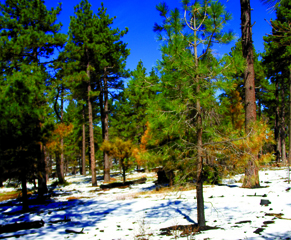Board of Supervisors faces lawsuit over plan to weaken voter-approved protections for Cleveland National Forest
San Diego – The Cleveland National Forest Foundation (CNFF) and Save Our Forest and Ranchlands (SOFAR) filed a lawsuit today in the San Diego Superior Court against San Diego County. The lawsuit argues that the Board of Supervisors adopted an amendment to the Forest Conservation Initiative based on a faulty environmental analysis and that it failed to identify opportunities to minimize the impacts of the new plan.
Board of Supervisors faces lawsuit over plan to weaken voter-approved protections for Cleveland National Forest
San Diego – The Cleveland National Forest Foundation (CNFF) and Save Our Forest and Ranchlands (SOFAR) filed a lawsuit today in the San Diego Superior Court against San Diego County. The lawsuit argues that the Board of Supervisors adopted an amendment to the Forest Conservation Initiative based on a faulty environmental analysis and that it failed to identify opportunities to minimize the impacts of the new plan.
The Forest Conservation Initiative (FCI) was approved by more than two-thirds of San Diego County voters in 1993 to protect the Cleveland National Forest from piecemeal development. Because breaking up the forest into small lots threatens the plants and wildlife that depend on the forest for survival, the FCI set minimum lot sizes of 40 acres throughout the forest and created clear boundaries for existing country towns within the forest to encourage compact development.
“The Forest Conservation Initiative is one of San Diego County’s most important planning success stories,” said Duncan McFetridge of the Cleveland National Forest Foundation. “The Board of Supervisors should do everything it can to protect and strengthen the FCI; instead, it’s doing just the opposite.”
The FCI included a clause requiring voter approval of any zoning changes within the area protected by the initiative until December 31, 2010, after which the Board of Supervisors was empowered to make such changes through an amendment to the General Plan. The County seized on the opportunity to allow further development in the forest by passing this recent FCI amendment.
The FCI amendment approved by the board would allow much smaller parcels within the forest than was allowed under the voter-approved measure. Smaller parcels encourage development outside of existing town boundaries within the forest. San Diego County has already zoned sufficient land to support the development of tens of thousands of homes in the unincorporated parts of the county. Its own General Plan calls for consolidating development around existing country towns to reduce vehicle travel and minimize greenhouse gas emissions. The approved plan disregards those policies.
“San Diego County continues to underestimate the threat of climate change by encouraging development in far-flung areas,” noted attorney Catherine Engberg of Shute, Mihaly & Weinberger, who represents CNFF in the case, along with Marco Gonzalez of Coast Law Group. “It’s unfortunate that yet another lawsuit had to be filed to force the county to comply with state mandates to reduce greenhouse gas emissions.”
In addition to concerns about climate change and disrupting forest habitat, the lawsuit notes flaws in the environmental analysis for the FCI amendment with regard to threats to water supplies, increased fire risk and harm to wildlife in the forest.
Under the California Environmental Quality Act, the county is required to consider alternatives that minimize environmental harm when it adopts a zoning change like the one included in the FCI amendment. The lawsuit argues that the environmental impact report used to justify the amendment was based on flawed assumptions that led to a faulty analysis.
The lawsuit also argues that the FCI amendment is inconsistent with county General Plan policies aimed at aimed at curbing greenhouse gas emissions and flouts current court orders requiring the adoption of a robust and binding Climate Action Plan and related policies. The county is currently defending separate lawsuits brought by the Sierra Club and the Golden Door Spa challenging its failure to adopt and implement a legally adequate Climate Action Plan.
“We have a forest plan that is working for San Diego County and for the natural areas it was designed to protect,” added CNFF board member Jana Clark. “The FCI amendment seems like another developer give-away aimed at making it easier to build up rural areas instead of promoting vibrant cities and villages throughout the county. It’s certainly not what the voters intended when they passed the FCI.”
For a copy of the complaint filed with the court, contact Nina Erlich-Williams at nina@publicgoodpr.com.












